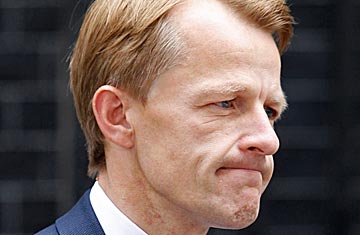
Former UK Secretary to the Treasury David Laws on May 12.
Since it was formed three weeks ago, Britain's new Conservative-Liberal Democrat coalition government has been touting itself as the herald of change. But some things, it seems, always stay the same. In a near re-run of the scandals that had been battering Westminster for over a year before the country's May 6 election, one of the government's most senior and respected cabinet ministers resigned on Saturday following revelations that he had broken parliamentary rules regarding expenses. It's the first major scandal David Cameron has had to deal with since becoming Prime Minister. And it could prove to be the incident that puts the first crack in the coalition's fragile unity and undermines its attempts to claim it is pioneering a "new politics".
After a story appeared in The Daily Telegraph on Friday, Chief Secretary to the Treasury David Laws, a Liberal Democrat and number two to Chancellor of the Exchequer George Osborne, admitted to claiming back tens of thousands of pounds of taxpayers' money through a housing allowance for a property he shares with his male partner. The wealthy Laws, who has claimed around £950 ($1,370) a month for the past eight years, insisted he had kept the arrangement secret because he did not want to reveal his sexuality to friends and family.
His explanation attracted some sympathy in Westminster, and both Cameron and his deputy, Lib Dem leader Nick Clegg, suggested Laws may return to government in the future. But the revelations ultimately made it impossible for him to continue as Chief Secretary to the Treasury, whose main task is to implement more than £6 billion ($8.5 billion) of cuts to the public sector.
This latest scandal comes soon after a months-long expose in the Daily Telegraph, which over the course of last year chronicled the widespread and systematic abuse by MPs of all parties of their taxpayer-funded allowances. The scandal undermined voters' trust in their politicians — which led to a series of moves to crack down on expenses abuse by both the current and the previous Labour government.
There had been real hope amongst all the political parties that the May 6 election, which brought more than 200 new faces into the House of Commons, would have a cleansing effect and finally draw a line under one of the most damaging scandals ever to hit the British political system. Now the Laws revelations have sent shockwaves through the coalition government, which fears the whole expenses nightmare may yet return to dog it, just as it had started to get its act together.
As expenses abuses go, though, Laws' was relatively minor compared to some. So far, three former Labour legislators and one Conservative Lord face criminal charges for theft relating to claims ranging from mortgage payments of tens of thousands of pounds to cleaning costs. Still, there was the risk that the most recent revelations would distract the government from its primary task of pushing through its program for economic recovery. So Laws had to go.
His resignation forced Cameron into a hasty re-shuffle of his top team, which required some nimble footwork to ensure another Liberal Democrat was given the job without infuriating those in his own party who might believe one of their number is more deserving. Cameron and Clegg already have to deal with the highly sensitive job of keeping all wings of their parties behind their coalition, particularly those who have never seen the Conservatives and the Liberal Democrats as natural political bedfellows.
So far the two leaders have succeeded. But it's early days, and how they are perceived to have handled this affair may prove crucial in keeping or losing the support of their allies, not to mention the voters who put them in power. Less than a month after the Conservatives and the Lib Dems came together, the honeymoon period could already be ending.
